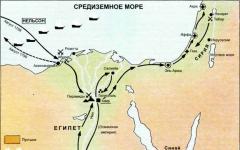Oh these three mysterious capital letters that have attracted any of us at least once! Why do I need this MBA, professionals ask. What will they teach me there? And what will I get thanks to the MBA in the future? Do employers value an MBA degree? Will it become a ticket to the circle of the business elite? Where to study - in Russia or abroad? And how to choose a school in terms of price/quality?
First, I’ll tell you why you might need this. And only then – where to go. Looking ahead, one thing is for sure: the only reason you don’t need an MBA is because you already have one!
What is an MBA?
MBA (MBA) - Master of Business Administration - is a qualifying master's degree in management (administration), implying the ability to perform the work of a middle and senior manager.
EMBA - Executive MBA - programs aimed at senior managers, based on significant work experience.
OK, where should I go?
And you should apply for an MBA if you have a higher education and work experience of more than 3 years. And for an Executive MBA, if you are over 35-38 years old and have at least 5-10 years of management experience. EMBAs are mainly awarded to business owners. The boundaries are not strict, you can easily try to charm the admissions committee of a particular educational institution, as, for example, my husband did at the age of 28 when he entered the London Business School for an Executive MBA.
Who needs an MBA?
– Company owners who are hungry for a new impetus for their brainchild (a new region, a new business direction, creating a network, etc.).
– Top managers interested in improving the efficiency of the companies they manage, as well as in their own professional and personal development.
– Middle managers who are ready to rise to leadership positions.
– Financial consultants and bankers, for whom an MBA is often a condition for promotion (mainly relevant for foreign companies).
– People with non-economic education. An MBA is a way to move into business or supplement professional knowledge with business skills.
– Specialists who have received an education that is already outdated and has lost relevance in the current business environment.
How to choose a business school for an MBA?
Let's talk right away about MBA programs at Western business schools. Indeed, why Russia? After all, initially the MBA was an American product, I won’t argue. But here you need to decide where you plan to work. Getting a Western MBA and staying to work in Russia in a Russian company is some kind of cunning plan to deceive everyone, including yourself.
In Russia there are high-quality MBA/EMBA programs, the main confirmation of this is the international accreditation of AMBA International. It accredits 11 Russian business schools. There is also European accreditation EFMD and American AACSB.
Business schools that have been accredited by at least one of the Big Three associations consider themselves to be the elite of business education. Any of the three “crowns” guarantees that international experts have carefully checked the quality of education at that school. It is equally important that Western accreditation means recognition of an MBA diploma from a Russian business school abroad.
The next criterion for choosing a business school is the national MBA rating. An important factor is also the age of the program, specifically the MBA program, and not the parent educational institution. Moscow State University and State University of Medicine can exist for as long as desired; look specifically at the age of the MBA program.
Who are the graduates?
I recommend that you familiarize yourself with the rating of the Association of Managers “Top 1000 Russian Managers”. For example, according to data for 2016, 31 participants in this rating were graduates of the IBDA RANH and GS programs. Their level confirms that it is not for nothing that the programs of this business school are number one in the popular rating index.
Who are the teachers?
Good MBA programs have a unique team of teachers: star lecturers, consultants and practitioners, the best foreign teachers, historians, sociologists, psychologists, theater directors, experts in the field of rhetoric, negotiations and etiquette. Be sure to look at who your teachers will be, from whom you would be interested in learning and gaining experience. Business schools are usually proud of them and happy to show them off.
How much does an MBA cost in Russia?
Let's compare the programs of leading Russian business schools in terms of tuition fees.
| Name of educational institution |
MBA cost, autumn, 2016 |
EMBA cost, autumn, 2016 |
|---|---|---|
| Institute of Business and Business Administration (IBDA) RANH and GS | 74 7000 rubles + 1000 euros | 1,595,000 rubles |
| Skolkovo | 60,000 euros | 90,000 euros |
| Higher School of Economics | 790,000 rubles | 680,000 rubles |
| MGIMO | 720,000 rubles | 980,000 rubles |
| Moscow State University Business School | 650,000 rubles | 1,100,000 rubles |
| State University of Management | 600,000 rubles | |
| MIRBIS | 560,000 rubles | 920,000 rubles |
| Graduate School of Management of St. Petersburg State University | – | 1,500,000 rubles |
| University "SYNERGY" | 210,000 rubles | 630,000 rubles |
| International Business School of the Financial University | 594,000 rubles | 980,000 rubles |
| Plekhanov Business School Integral | 520,000 rubles | – |
How to get an MBA for free?
A bit expensive? The opportunity to get an MBA for free also exists. Many companies are willing to fully or partially pay for their employee’s training. Of course, not for beautiful eyes, but most often for an obligation to work in the same company for another 3-5 years after receiving an MBA.
How to apply for an MBA program?
Entry requirements for business schools vary. Most often, a very detailed questionnaire awaits you. Candidates are carefully selected, because graduates will then be the face of the school. You may need letters of recommendation. They may ask you to write an essay on the topic: “Why do you need an MBA?” or “Strategy for my personal development.” Many schools conduct the exam in a case study format (analysis of a specific situation, case). Some require TOEFL (Test of English as a Foreign Language) and GMAT (Graduate Management Admission Test), which assess the applicant’s general level of knowledge and degree of English language proficiency.
The final stage of admission is an interview or interview. In a casual conversation, you must convince the examiner that you deserve to undergo training and justify why you need it. You need to be prepared for questions in different directions: about your strengths and weaknesses, about the reason for choosing this particular business school, about plans for the future, etc. They also look at the overall adequacy of the candidate. They often try to select a homogeneous group by age, for example 29-32 years old, because after 2 years of study the group will become practically a family.

When to apply and in what mode is it better to study?
MBA programs enroll primarily in the fall, but most popular business schools enroll twice a year—in the fall and in the spring.
The training system is evening, modular and weekend. When choosing a program, especially an evening program, you should definitely take into account the location of the business school. Otherwise you’ll have to sit through half of your classes in traffic jams or use transfer buses to get to the desired airport. For example, RANH and GS, located in the south-west of Moscow, has a separate building in the very center of the capital directly for top-level programs (the IBDA Executive MBA program classes are held there), so that students can easily get to school and study comfortably.
In a weekend format, classes are usually held once a month on Friday, Saturday and Sunday. This makes it possible to work fully without being distracted by studies, and also to attract people from the regions.
MBA programs last almost two years. In many schools, the program also includes a foreign module, which involves a week-long internship at leading foreign business schools, such as Judge at Cambridge University or Rotterdam Business School. The purpose of this module is to introduce students to the latest foreign developments in the field of management and leadership, and to the peculiarities of working in a globalized world economy.
There are business schools that offer completely foreign programs in partnership with renowned schools such as Grenoble Graduate School of Business, Stockholm School of Economics, Antwerp Management School, etc.
So what does an MBA get you?
(You can use this in your admissions essay, I don't mind.)
– career growth = increase in income;
– change of industry;
– MBA changes psychology and understanding of business; as it is now fashionable to say, it forces you to get out of your comfort zone, get a new interesting experience and shake yourself up well;
– the opportunity to find a partner to create a new business;
– new markets (geography);
– communications, communication, networking, updating the list of business contacts;
– trainings and collective mind games expand consciousness – you will see prospects for growth in that area of finance or business that previously seemed like a dead zone to you, you will be able to abandon stereotypes and see new unexpected horizons;
– learn to find more effective solutions for your business problems without interrupting your current work;
– even if there is no immediate result, over time new knowledge will begin to pay dividends and will be useful in one way or another in life.
Well, let's be honest: economic education and business education are different things. You may have a higher economic education, but this is only theoretical knowledge. An MBA gives you a comprehensive, diverse understanding of management processes; you learn to use modern management tools in practice, and as a result you will be able to effectively solve the complex problems of modern business. You will learn to generate development concepts and, following them, change yourself and your environment, take on any life and professional challenges, regardless of your type of activity, industry, company or country. In general, good luck!
Master of Business Administration (MBA) is a program whose goal is to prepare middle and senior level managers. Recognized throughout the world as a high degree in management. Unlike higher education, an MBA has a practical orientation and involves an interactive exchange of information between tutors and students. This approach allows you to successfully apply the studied theories to solve existing problems in management.
MBA allows you to solve a number of problems:
- Systematize knowledge in the field of management and master new tools for analysis and evaluation;
- Improve management skills;
- Improve the quality of business processes in your own company;
- Gain competitive advantages, increase demand in the labor market and increase income from the profession;
- Establish business contacts.
Education at MIM LINK
LINK Business School is the exclusive partner and representative of the UK Open University Business School, which is a leader in the global distance education market in this area. British MBA programs have international accreditations AMBA, EFMD/EQUIS, AACSB. The teachers have extensive management experience and are highly qualified. The MBA programs offered allow you to reach new heights in career and personal growth. They include issues of marketing, management and financial management. Information is updated in accordance with changing business needs. The average duration of training is 2-3 years.
MBA Strategy Program

Duration: 2.5 years
Classes in Russian
In the MBA "Strategy" program, much attention is paid to the study of theoretical approaches using unique technology. Target audience: middle and senior managers, business owners. Students analyze and comprehend their professional experience, which allows them to acquire new management skills or help them develop their own business. Students are completely immersed in a learning environment that involves the direct exchange of knowledge both in person and in an interactive format. The program is aimed at developing reflection, strategic and critical thinking. The classes create a unique environment for free communication on personal and professional topics.
Different technologies are used in training:
- face-to-face group classes (tutorials);
- independent work with interactive educational materials, audio tasks for self-test;
- communication at conferences in the Internet format;
- participation in visiting schools designed to systematize knowledge;
- performing written exercises and papers that require analyzing real-life management problems;
- individual consultations.
The structure of the program consists of two stages:
- Course "Effective Manager".
- Three compulsory courses and one optional out of seven offered.
The Strategy program includes the following specializations:
- finance,
- marketing,
- human resource management,
- knowledge management.
Final stage
Before completing their studies, students write a thesis and defend it in Moscow. Graduates who complete this program master the skills of crisis management and project management. They not only successfully solve strategic management problems, but also strive for constant self-development and self-improvement.
MBA program The Open University Business School

Duration: 3 years
Classes in English
The program was created so that English-speaking employees of foreign companies with branches in Russia could study with it. It is also aimed at senior managers working in the international market. Educational technology includes personal communication, Internet conferences, visiting schools, joint work on projects, analytical sessions, etc. Traveling schools are held in Western European countries.
consists of from two steps:
- It offers two possibilities: studying the “Management: Perspective & Practic” course in English in Moscow or the “Management in Action” course in Russian at the selected MIM LINK training center.
- The training consists of three compulsory courses and three out of eight elective courses. Held in Moscow.
The program includes possible specializations:
- marketing,
- financial management,
- management.
Basic Requirements
Students wishing to enroll in first-level courses must be over 25 years of age (preferably), have a higher education (a copy of the diploma is provided) and three years of work experience, which is confirmed by a career history. If there is no higher education, then the student first undergoes a one-year “Effective Manager” program at the training center.
There are certain requirements for applicants to study in English:
- English proficiency at TOEFL level (580-600);
- passing the Cambridge exams CAE (level A), CPE (B) or IELTS (6-7).
Graduate design
During the diploma design, the student applies the acquired knowledge and skills. The supervisor provides assistance to students in the form of individual consultations. The stage ends with a public defense of the work in the presence of an attestation commission consisting of the chairman, leading teachers of MIM LINK and representatives of customer organizations. Meetings are held annually in the second ten days of December and May.
National requirements for the general content and conditions for the implementation of MBA level programs
(NASDOBR, 2015. extract)
1.
MBA level program
is a professional development program of a generalist nature for those who have the relevant significant practical experience necessary to contribute to the educational process within their group, with an emphasis on leadership, strategic management and career guidance.
2.
The purpose of the MBA program is to:
- systematize and enrich previous practical experience.
- develop students' strategic thinking, entrepreneurial skills, innovation and leadership skills.
- develop understanding and experience in studying key business issues, including business transformation and globalization, and identify the potential contribution of business to solving these problems.
- develop interpersonal and teamwork skills.
- develop the ability to apply accumulated and newly acquired knowledge and experience to solve complex business problems in different contexts.
- ensure the acquisition of knowledge at an advanced level in the field of managing an organization and studying the environment in which it operates.
- to form an understanding of socially responsible business management.
- promote lifelong learning and personal development.
3.
At least 60% of teachers
participating in the implementation of basic professional disciplines of the program submitted for accreditation must be full-time teachers
educational institution, have an academic degree and/or title, and at least 5 years of experience in scientific and pedagogical work.
TO basic disciplines include
disciplines in management and organizational development strategies, which form the basis of a professional approach to solving problems of management of organizations from generalist and functional positions in a strategic perspective.
4.
To teaching special disciplines
Managers, specialists, professional trainers, coaches, consultants with practical experience in business or scientific research and development in this subject area should be primarily involved (at least 70% of the total number of teachers in special disciplines).
Special disciplines (mandatory and elective) include disciplines of functional, industry and other specialization of the MBA program and provide in-depth consideration of the most important aspects of business and management, based on the specifics of the MBA program and the target group of students. This makes it possible to take into account the individual preferences of students in terms of their organizational and career interests.
5. Nature of the MBA Program takes into account the relevant work experience of trainees. The program is designed for those who will soon be able to make a significant contribution to the management of the organization at a strategic level. It should provide both an intellectually challenging training program and opportunities for personal development.
6. Highly specialized professional retraining programs for managers (in the field of finance, marketing, personnel management, etc.) do not belong to the MBA category, if their educational and thematic plans do not provide a balanced study of all the main aspects of managing an organization in a comprehensive manner.
7.
The MBA program should
provide relevant knowledge and understanding of the organization, the external environment in which it operates, and interaction with shareholders. Compliance with standard program content requirements should be achieved. The program should ensure that students receive general knowledge in the field of management, including:
- concepts and processes in the field of production and marketing of goods and/or services, financing of an enterprise or other form of organization.
- concepts and methods of accounting, quantitative methods, and management of information systems, including IT applications.
- organization theory, organizational behavior, human resource management, and interpersonal issues.
- processes and problems of general management at the operational and strategic level.
- macro and microeconomics.
- the influence of environmental factors on the organization, including legal systems, demographics, ethical, social and technological issues.
- change management skills.
- business policy and strategy.
- leadership and entrepreneurship.
- business sustainability, ethics and risk management in business decision making.
- contemporary aspects such as creativity, entrepreneurship, innovation, e-commerce, knowledge management and globalization.
8. MBA level program must be holistic (integrated) and develop the student’s ability to combine knowledge and skills acquired in individual courses. This can be done through a project in which trainees can demonstrate an understanding of the theory and how it can be applied.
9.
Standard volume of an MBA program
for any form of training is at least 1800 hours of academic work, of which at least 600 hours of classroom training. It is allowed to replace classroom training in an amount not exceeding 300 hours by conducting classes remotely
10.
Programs can take place in full-time and part-time formats
, use distance learning methods or be mixed.
The program is supported through an online platform that students can access off campus and outside of class hours.
In programs developed in modular basis
, the structure must take into account an interdisciplinary approach to management and provide means by which the integration of individual subjects is achieved.
Programs can conduct significant part of the learning process remotely or in a “blended learning” format . Programs operating in such modes must ensure that students receive an education equivalent to that of full-time students.
European Guidelines for MBA Programs
(accepted by EQUAL, signed by the Russian Association of Business Education)
Generalist MBA Program
designed for people with work experience, focused on educational results (acquired knowledge and understanding, professional skills and abilities, universal skills and abilities), this is a program that develops strategic thinking.
Section 1. Economics - legal environment of business
- Patterns of economic behavior of subjects
- Macroeconomic indicators in the company's activities
- Business law
- Labor law
- Corporate governance
- Institutional relations
Section 2. Personal and professional development
- Manager's systems thinking
- Professional manager skills (training)
- Personal management art
- Team building (training)
- Business communications (training)
- Career Development Program
- Self-management
- English language
Section 3. Financial management
- Financial and credit system
- Financial markets and financial institutions
- Taxation
- Accounting and financial analysis for managers
- Accounting
- Management accounting
- Financial analysis
- Company financial management
- Basic Financial Management Concepts
- Investment management
- Enterprise valuation
- Risk management (optional course)
- Financial technology
- Organization of the securities market and exchange operations
- Making short-term financial decisions
- Tax management (elective course)
- Formation of financial policy of an organization (optional course)
Section 4. Management
- Evolution of management thought, systematic approach to management
- General and operational management
- Implementation of a balanced scorecard
- Logistics management
- Strategic management
- Quality management
- Business planning
- Project management
Section 5. Person in the organization
- Organizational behavior
- Conflict Management
- Survival strategy (training)
- Human Resource Management
- Change management (training)
- Cross - cultural management (elective course)
- Management technologies
- Leadership in management (training)
- Theory and technology of effective communications in management (training)
Section 6. Information Management
- Information systems and technologies
- Information and knowledge management
- Telecommunications Qualifications
Section 7. Marketing
- General Marketing
- Marketing Management
- Making pricing decisions.
- Marketing communications technologies
- Marketing technologies
- Sales management (training)
- Branding (elective course)
Section 8. International business and management
- International business environment
- Foreign economic activity
- International Business Technologies
Section 9. Applied projects. Independent work
- Consulting.
- Management consulting.
- Internships (optional).
- Computer business game (optional course).
Certification project.
“Why MBA at PwC? I got what I wanted in a short period of time: clear, specific, effective. I had a desire to gain a volume of skills in a short period of time. That’s why PwC’s intensive format was right for me: it was told in a structured way from start to finish. I really liked the highly qualified teachers who are related to working in large global companies. Real experience, real advice. There are a lot of useful techniques on strategy, finance, project management, personal effectiveness that you can take and apply in practice.”
Vyacheslav Nechaev Vice President of the Department, UFS
“My impressions of the MBA program at the PwC Academy completely coincided with my expectations: I acquired what I wanted to get: new knowledge, new skills, useful contacts. The MBA course was put together very competently, precisely from those areas that I would like to develop. The program itself is structured in such a way that it allows you to immediately apply the acquired knowledge in practice. We have already started certain projects in the company in areas that we would like to change in accordance with the new knowledge acquired. Therefore, I consider this course practically applicable. And from this point of view, it is most useful for real business.”
Andrey Kuzmin Head of Financial Department, State Unitary Enterprise Moskollektor
“The PwC MBA program first of all justifies the main financial investment of modern life – an investment in yourself, in your education. The Academy program helped me change my attitude towards my goals and acquire invaluable skills in working with people. An MBA allows you to find yourself in life, understand your strengths and weaknesses, and directions for your personal development.”
Alexey Milov Chief Financial Officer, Gilbarco Wieder-Ruth
“I chose an MBA at PwC Academy because I heard so much about it. PwC very clearly monitors all the modern trends that exist in the world of education, and clearly sees the requirements that managers who plan to improve their qualifications place on the level of education. The program is selected very optimally; the content of the MBA modules practically covers all the tasks that a manager faces in his work. The educational process was structured not only in the form of lectures and answers to questions, but also business games. And this also helped a lot, and if in the first lessons we were a group of students, then we turned into a team. I want to note that the PwC Academy showed the highest level of the educational program, and not just the program itself, but also the organization of the learning process - this was also very important.”
Alexey Shmakov Head of Sales and Marketing Department, VIKA MERA CJSC
“MBA diploma with the quality mark of one of the four best consulting companies in the world. This is a really important milestone for me. Second honors diploma in my life :-) I approached my studies with an impressive baggage of completed IT projects, in which I acted as a manager. In order to rethink this experience and move on, it was very important for me to gain a new vision, expand boundaries, and reach a global level of understanding of business activities. The course allowed us to fully implement our plans. The modules are not isolated “facts on a topic”, but, like a mosaic, they build an overall picture of the functioning of the organization. This MBA course really took me to a new level of management competency. I am very glad that I decided to receive my MBA education in the company of the big four consulting and auditing companies, which accumulate enormous experience in accounting in the largest companies in the world. I believe that this is exactly what modern management education should be like.”







